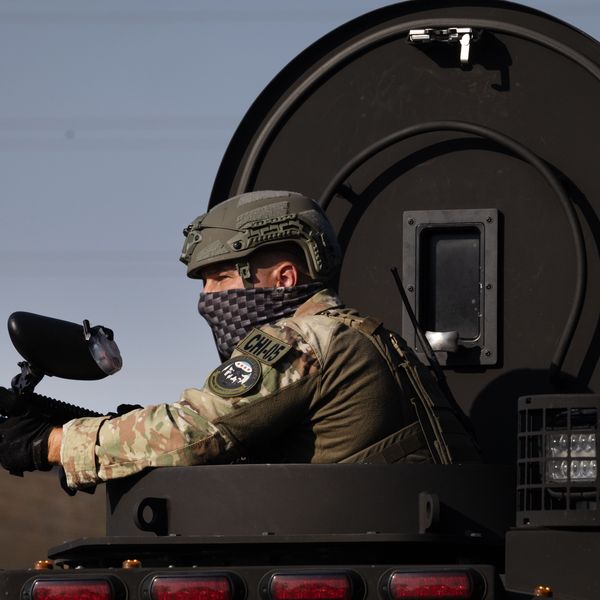Rights groups and others are welcoming the release of a report by the president's policing task force on Monday, saying that the policy recommendations are the best chance the White House has for improving the relationship between law enforcement agencies and the communities they are meant to protect and serve.
The President's Task Force on 21st Century Policing was established in the wake of recent police killings of people of color in an attempt to build trust between citizens and law enforcement. The Interim Report (pdf) calls for increased transparency around incidents of police brutality, an emphasis on de-escalation, and policies that prohibit police profiling and discrimination of any kind, among other things.
"The majority of the recommendations in the report are ones that the ACLU has pushed for and stood behind for quite some time," Kanya A. Bennett, legislative counsel at the American Civil Liberties Union, said in a statement following the report's release.
"Most of the recommendations are essential and should be non-negotiable," Bennett continued, adding that should the White House choose to adopt the recommendations, the policies will "significantly improve the relationship between law enforcement and the communities they serve, particularly communities of color."
And Daily Kos reporter Shaun King, who has followed the aftermath of police killings in Ferguson, Missouri and elsewhere, said the report is "the best thing [he's] read since Mike Brown was killed on how we can best change policing in America."
One pillar of the 150-page report--which is the culmination of 90 days of research, including six "listening hearings" with researchers, police and community leaders across the country--is the importance of building public trust and legitimacy.
The report argues: "People are more likely to obey the law when they believe those who are enforcing it have the right--the legitimate authority--to tell them what to do. Building trust and legitimacy, therefore, is not just a policing issue. It involves all components of the criminal justice system and is inextricably bound to bedrock issues affecting the community such as poverty, education, and public health."
Calling for increased transparency, the task force recommends that local law enforcement agencies be required to report to the federal government when their officers kill someone and that an independent criminal investigation be held in cases of "police use of force resulting in death, officer-involved shootings resulting in injury or death, or in-custody deaths."
"There is a recognition that we need to collect this data. There's absolutely no question about that," said Philadelphia police commissioner and task force co-chair Charles Ramsey in a press call on Monday following the group's meeting with President Obama.
In a nod to the history of police misconduct, another key recommendation is that law enforcement agencies "acknowledge the role of policing in past and present injustice and discrimination and how it is a hurdle to the promotion of community trust."
Going forward, the task force says that agencies should re-evaluate policies that promote racial profiling and other negative interactions with civilians.
The report says that law enforcement agencies should "adopt and enforce policies prohibiting profiling and discrimination based on race, ethnicity, national origin, age, gender, gender identity/expression, sexual orientation, immigration status, disability, housing status, occupation, and/or language fluency."
Additionally, the panel argues that local agencies should reflect the demographics of the community they represent and the federal government should implement an initiative to work towards this goal.
The group also calls for federal immigration enforcement to be "decoupled" from routine local policing.
Further, agencies should refrain from mandatory quotas and support use-of-force training that "emphasize de-escalation and alternatives to arrest or summons in situations where appropriate," the report adds.
The report also recommends that police evaluate the "collateral damage" to public trust as a result of various law enforcement strategies, such as using "physical control equipment and techniques."
In a post on Monday, King of Daily Kos added that, although imperfect, the recommendations are "well written, skillfully organized, and focused on concrete, measurable action steps."
"If followed, our world would be a better, safer place for all," King added.
President Obama now has 30 days to direct the task force to follow up on the recommendations before the panel is dissolved.

